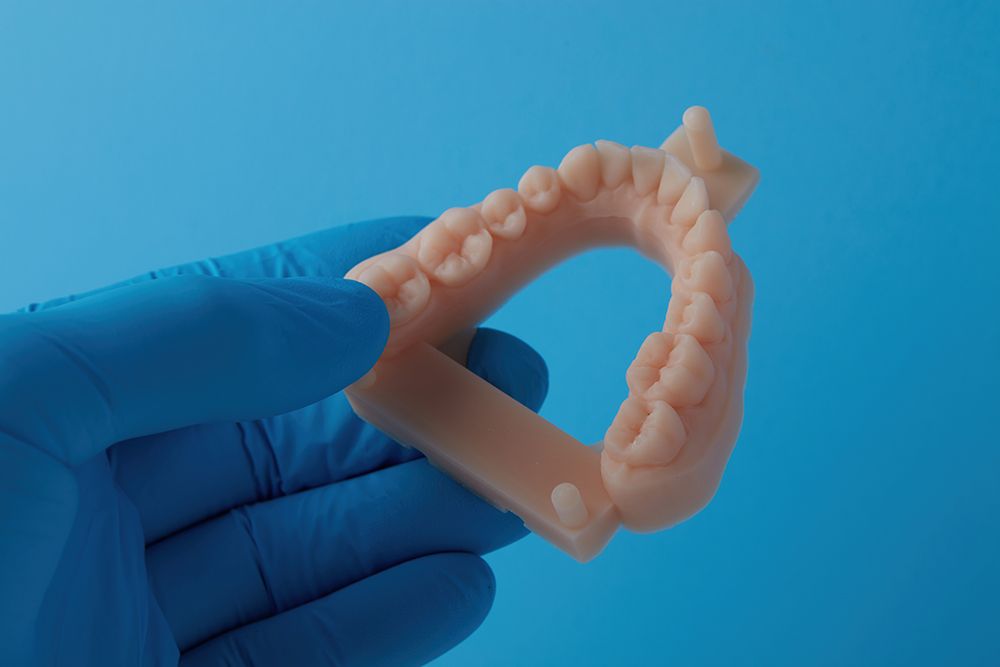Formlabs Showcasing 3 High-Throughput Production Solutions for Dental Models at IDS
Across its SLS and SLA platforms, company is prioritizing print speed and affordability, enabling dental labs and clear aligner manufacturers to more efficiently produce models.

Now that Formlabs’ benchtop industrial selective laser sintering (SLS) printer has been validated for orthodontic model production, the 3D printing company today announced it will be showing off 3 high-throughput production solutions for dental models for the first time at the International Dental Show (IDS) in Cologne, Germany this week.
The 3 solutions for high-throughput production of dental models include:
- The Fuse 1, the world’s first benchtop industrial selective laser sintering (SLS) printer, has been validated for orthodontic model production and will be shown for the first time at IDS.
- The upcoming reformulation of the popular Model Resin which will double the speed of restorative model production on the company's flagship dental stereolithography (SLA) printers, Form 3B and Form 3BL.
- The validation of Form 3B, Form 3BL, and Fuse 1, by 3Shape for their Clear Aligner Enterprise solution.
This suite of new hardware, software, and material solutions for the dental industry enables Formlabs users to increase the speed of their dental model manufacturing while reducing costs.
“Dental manufacturing demands a high degree of customization, and 3D printing is the key solution to enabling that customization at scale without sacrificing cost, speed, or quality,” says Dávid Lakatos, Chief Product Officer at Formlabs. “With more than 10 dental-specific resins powering our SLA line of printers, we are disrupting the dental market with high-speed resins for dental practitioners and labs to create high-quality, patient-specific dental products. Now with the Fuse 1’s validation for dental manufacturing we are expanding our dental offerings to our SLS line of printers and enabling even greater speed, versatility, and affordability for our dental users.”
The Fuse 1 is designed to reduce costs and labor by enabling large dental manufacturers to produce more than 150 dental models for clear aligners in a single print. Compared to other SLS 3D printers, the Fuse 1offers a more accessible price and easier workflow while delivering high quality parts, according to Formlabs. When compared to already-affordable SLA costs, it enables laboratories and clear aligner manufacturers to reduce the cost per part by 50 percent, while simultaneously increasing production volume. This enables more efficient model production.
With the reformulation of its Model Resin for the SLA platform of printers, Formlabs is enabling dental labs and practitioners to slash turnaround times and produce more models each day. The new formulation reportedly reduces print speed by 50 percent and overall work time, including post-processing, by 60 percent.
The importance of speed in dental manufacturing is a given. When Formlabs released its fast-printing Draft Resin for orthodontic model production last year, it quickly became a staple in labs that rely on digital workflows. David Leeson, EVP of Laboratories Operations at Glidewell, one of the world’s largest dental labs, has shared that "Formlabs' new Draft Resin is the fastest-printing SLA material we've used and has accelerated our throughput by nearly 40 percent.”

3Shape’s Clear Aligner Enterprise solution provides software to clear aligner manufacturers for treatment planning and digital production preparation. The dental scanning and software company has validated the interface between their digital workflow and the Form 3B, Form 3BL, and Fuse 1, confirming that they are suitable for clear aligner model production, demonstrating the value and quality Formlabs’ robust dental solutions bring to the industry. The Fuse 1 is the first SLS 3D printer validated by 3Shape for production of clear aligner models. Formlabs and 3Shape partnered previously to enable fabrication of surgical guides, splints, and more. This partnership continues both companies’ commitment to make workflows more efficient and drive forward the standard of care in orthodontics.
“Formlabs Dental is laser focused on making flexible and patient-specific treatment protocols accessible to every dental professional through 3D printing. To achieve this we are constantly looking for partners, and 3Shape recognizes the benefits of our printers,” adds Sam Wainwright, Formlabs Dental Product Manager.
ACTIVA BioACTIVE Bulk Flow Marks Pulpdent’s First Major Product Release in 4 Years
December 12th 2024Next-generation bulk-fill dental restorative raises the standard of care for bulk-fill procedures by providing natural remineralization support, while also overcoming current bulk-fill limitations.